“My soul is here”: thanksgiving on the front lines of the war in Ukraine – The Daily Signal
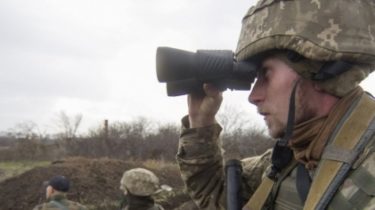
“My soul is here”: thanksgiving on the front lines of the war in Ukraine – The Daily Signal
© UNIAN
Former us military shared his impressions from the front in the Donbas.
Night I woke up to the sound of artillery fire. It is so loud and close that it shake the walls.
This writes Nolan Peterson in the article “My soul is here”: thanksgiving on the front lines of the war in Ukraine”, published on the website of the newspaper The Daily Signal.
The man lying next to me stirred. I look at my brother, drew, he’s sleeping. We both curled up in their sleeping bags.
Above our bed on the wall, near the Ukrainian flags hanging Kalashnikov rifles, bulletproof vests and grenades. On the table are letters from families of Ukrainian soldiers near the bullets and grenades.
Ukrainian soldiers sleep in this room, but I only hear the breathing of his brother.
The smell of burning wood and dust. This small room is used to heat the boiler. We are on the top floor of an abandoned building, which the 92nd mechanized brigade of the Ukrainian army turned the Fort into a fortified town Marinka on the front.
See also: the War in Eastern Ukraine is to Europe a greater threat than the conflict in Syria – The Daily Signal
The roar of gunfire could be heard through brick and concrete walls. Sound dust, crumbling like a waterfall, the Windows creak from the cold winter wind outside.
I remember the time when me and drew were kids. I imagine that this is the sound of a thunderstorm in Florida and my brother (we are now 30 and 34) are sleeping in FORTS built out of pillows.
Then a sharp metallic sound of a machine gun nearby. Reality.
The presence of my brother (sleeping peacefully on the background of all this) is the link to the house in a place that is far away from him, as from the point of view of miles and circumstances.
I’ve seen this war before. But just as when I was visiting my brother in Afghanistan when he was a soldier, drew’s in this war makes it more real.
Yes, drew makes the war so real, like never before. I never looked at it as a passenger looking out at the world passing outside the train. I’m here. I’m in it.
The same feel and Ukrainian soldiers, many of whom live just a few hours away from the front line. If they wanted, some of them could go home during the break between Breakfast and lunch. Some of them are away from their homes and families for almost three years to fight in this war.
I hear that my brother is sleeping among the roar of war on the street and realize I’m completely. I understand, at least marginally, what this war is for the Ukrainian soldiers who are fighting.
With grenade launchers and machine guns, the militants shelled Marinka and Krasnogorovka
TSN. Wounds
Yesterday, 09:32
Add to favourites
Mortar fire near Mariupol: there, the militants again shelled Shyrokyne and to Talakovk. Mortars 82 kabiru firing in the direction of Lugansk. There, under the fire of Russian mercenaries Crimean, and Novoaleksandrovka Village of the Luhansk. From the occupied Donetsk shelling the neighborhood of the Town. Data on losses among the Ukrainian military yet.
Transitions
A little earlier, my brother and I tremble at the roof of the Fort of the 92nd brigade.
The night is cold, windy, and clear. You can see the stars and the fire of shells, which cuts through the sky, flashes of artillery and mortars, exploding at regular intervals of time several times per minute.
We feel the vibration from the explosions. And staccato, increasing the roar of small arms fire easily cuts through the cold air.
One Ukrainian soldier stands near us.
“Normal night,” he says.
“Why does the world not know about this?” asks my brother.
Drew is a former captain of the air force, who now lives and works in new York. He was twice in Afghanistan, and recently returned as civilians to run a marathon initiative in support of the rights of local women.
He came here to Ukraine to start a humanitarian project to assist internally displaced persons. (About 1.7 million Ukrainians have fled their homes because of the war.)
See also: U.S. General compared Putin’s actions in Ukraine with Stalin’s invasion of Poland – the Daily Beast
“War does not fit this area, as it was in Afghanistan,” says I drew. “This place looks familiar. And war seems like a nightmare. As this kind of thing still exist in the modern world, and in Europe? And how is it possible that so few people knew about it?”
This war is different from wars in Afghanistan and Iraq, with whom we drew most familiar. It is not a country at war, this war is the goal. Once you get here, then immediately immersed in it.
In Ukraine it’s been almost three years. The phrase “war in Ukraine” now means little. This is the story of the last pages in Western Newspapers. This is normal, expected, and just a muffled voice in the chaotic chorus of world news.
“”Before leaving new York, I told my friend that I would go to Ukraine and go to the front,” says my brother. “She said,” Oh, it’s still going on?”.”
My brother and I some time watching the play of artillery. When you see it with your own eyes, it is very difficult to look away.
We don’t speak; what to say at a time like this? Aside from occasional comments about what we see, as if we need confirmation that what we have is real.
Very cold, and we will soon go to sleep. At the end of the day I think about how it started, and about the absurd distances that can be covered in one day. Distances that encompass much more than a mile.
The distance
The day starts before sunrise in Kiev. In the apartment I made coffee and ordered a taxi, Uber, which was to take us to the station. Then a six-hour trip on the train in Eastern Ukrainian city Kramatorsk.
Along the way we chew protein bars, listen to music in their iPhones and read the novels. The train has wifi, so we check the mail.
Arrival in Kramatorsk. We meet with our driver and translator, and we take our vests and helmets. In a way. Our driver took a wrong turn and we got stuck in the mud. We leave the car (black Mercedes) broke down.
Our translator instantly takes your cell phone and change plans. I fear that this trip quickly becomes a disaster and we didn’t even get to the front line. But the interpreter arranged for the arrival of another driver.
After a few hours the new driver, Edward, picked us up from the curb where we waited for him, shivering from the cold. We are back on the road.
Read also: Putin lied to the West and is just beginning a war against Ukraine – Daily Beast
Day. But in the Ukraine in the winter the sun sets at about 4:30. We’re in a hurry to get to Marinka to dark.
We are hurtling along a pitted two-lane road that cuts through a wide field, many of them are still green, even in mid-November. The sun sinks lower and lower, and we worry about whether we get there in time. The sky turns orange and then purple. Nearly night.
Lucky for us, we passed through checkpoints. Our driver – friend soldier; he often carries supplies to the front line. He has a special pass, and the soldiers let us through.
We ride through farmland and villages, but the area seems to be wild. As in the Himalayas, where the night is deadly cold. Or in the Serengeti, where, after sunset appear to the raptors. Here, in the East of Ukraine, the night is coming war.
In the sky stars appear. Long, straight road on the open plains. Ahead the dark silhouettes of buildings in Marinka. The Donetsk, a stronghold of the separatists.
Somewhere up ahead, lurking in the glares of this day, hiding war. Here, in the car, it is not seen and not heard. But you can feel the tightness in your chest, the flutter of butterflies in your stomach, the feeling of adrenaline and anxiety. It’s all a figment of your imagination.
Some kind of sixth sense, a relic of evolution, hidden deep in the subconscious warns you of danger at night.
When we come to the Marinka outside the window almost dawn, but shelled with artillery the house are still visible.
We go into an apartment house to meet up with family and dinner. We got out of the van and heard the sound of distant mortars, greeted us. They respond the roar of machine guns. War. We’re here.
The militants destroyed the cafe, a five-storey building and houses in Marinka
ATO
16 Oct, 17:35
-
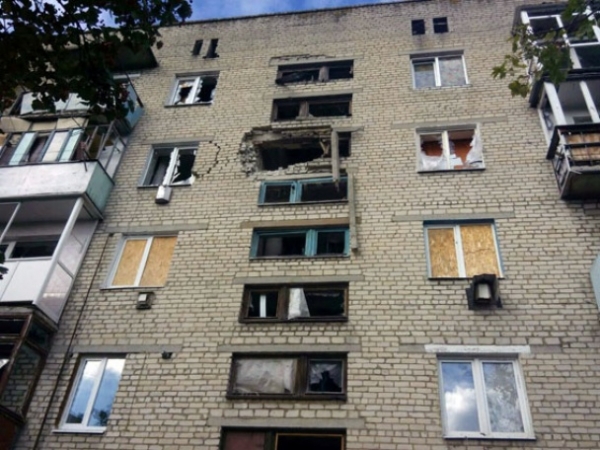
1 of 7
The consequences of attacks by militants.
© Department of communication of national police of Ukraine -
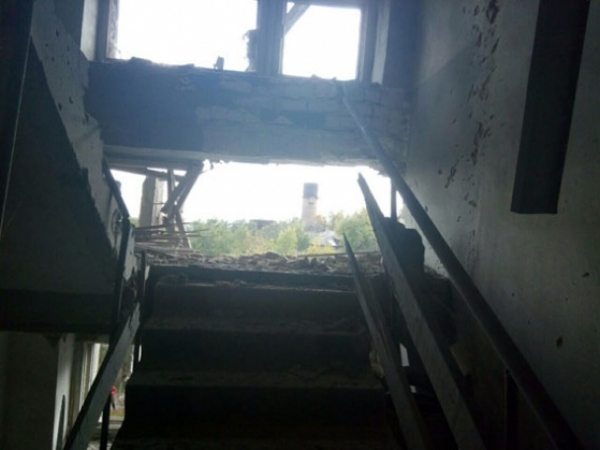
1 of 7
The consequences of attacks by militants.
© Department of communication of national police of Ukraine -
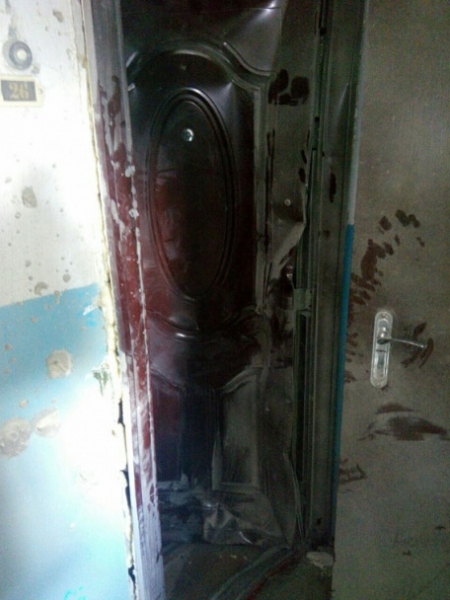
1 of 7
The consequences of attacks by militants.
© Department of communication of national police of Ukraine -
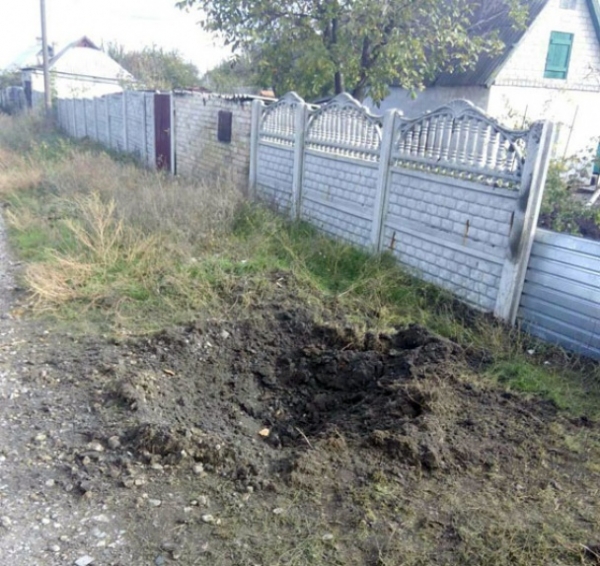
The consequences of attacks by militants.
© Department of communication of national police of Ukraine -

The consequences of attacks by militants.
© Department of communication of national police of Ukraine -

The consequences of attacks by militants.
© Department of communication of national police of Ukraine -

The consequences of attacks by militants.
© Department of communication of national police of Ukraine
Friends
In a stairwell in a residential building in the dark. We use our iPhones as flashlights. The building is almost nobody lives. Half of the original 10,000 inhabitants Marinka left. They drove the war.
We cross the threshold of the house, and inside the apartment, the war immediately becomes a memory. The owner, a soldier, a former specialist in helicopter maintenance, independently carried out to your house electricity and running water. There you can feel at home.
Sit down to dinner, Kazakh food, which the elderly veteran learned to cook in the Soviet army. He pours us a glass of homemade alcohol, made from walnuts.
My brother and I are veterans of the air force. I am in Afghanistan and Iraq; and, drew, several times in Afghanistan. We drank with the old Soviet soldier.
We all three served in Central Asia. We know the same places of the same name. Such different circumstances. Today we are friends.
The wife of an old soldier brings his Soviet uniform, she delightedly points to a lot of his medals. He pours more vodka for all of us. Not enough words to describe this; we glorify memories.
After dinner we drive through the city, where Ukrainian soldiers. They turned an abandoned building and its surroundings in the Fort.
Tanks and armored personnel carriers scattered in the muddy yard and hidden in various caches. We were escorted to a room where more than a dozen soldiers resting in their beds.
Read also: Russian militants learn spartito how to get to Ukraine and to arrange a war – Daily Beast
First, silence. Shivering, until our interpreter explains who we are. Then when she said we are both veterans of the American wars, flips a switch. Instantly, easily, the Ukrainian military are taking me and my brother into their ranks.
I explain that now I’m a journalist, not a pilot. And I’m here to tell you about their war.
The soldiers tell us that they feel like they are forgotten – their own government, as well as the world.
Ukrainian soldiers treat me and my brother as honored guests. Get a bottle of something. Distribute food. Bread, bacon, pastries (a gift to the brigade from our driver), and roasted potatoes.
Toast, assurances of friendship. Questions about new York, Miami, our newly elected President. They want to know about life in the us army, how much we paid, the benefits that we receive as veterans.
“We ask the Ukrainian soldiers what they are fighting for. They talk about freedom, democracy, the protection of their families. My brother and nod approvingly.”
They ask our opinions about Ukrainian women. I tell them that my girlfriend is Ukrainian. They nod approvingly.
We ask the Ukrainian soldiers what they are fighting for. They talk about freedom, democracy, the protection of their families. My brother and nod approvingly.
Pat on the back, of the story told through the language and skills of our interpreter.
Two days before thanksgiving and although the food and drinks we’re strangers, feel the same way. How is it possible that we so easily feel at home?
A few hours after sunset, we observed the daily farce of a cease-fire. Observers of the OSCE (Organization for security and cooperation in Europe) working in the daytime, and when they go home, the real war begins.
Contact fighting and the movement rushes: military told about the situation in Marinka
TSN. 19:30
26 Nov, 20:34
Add to favourites
On the houses of Marinka difficult to find surviving wall. As a rule, in the far streets of the village almost nobody lives, because now they are one of the hottest spots of the ATO zone. There is almost daily contact tie fights. In another way, as dashes, the military here does not move. Each position is surely strengthened by several layers of sacks of earth, have a scrim, so that the enemy did not see the movement of our military.
Every so often the shock of artillery and rattle of small arms turns into a discordant Symphony as the culmination of the end [of the song] “A Day in the Life”.
The walls rattle from the shelling. The roar of artillery close enough to really scare you, but pretty close to switch you to another mode of existence, which is only possible in the war.
However, in this war and others, I have often noticed that the louder the explosions, the louder the soldiers respond with laughter and conversations. As if the camaraderie and humour is the most reliable means of protection from bullets and bombs. For spirit, at least. But in laughter there is something that overrides the fear of death.
Me, my brother and a few soldiers came out. The night air is very cold. We look at tanks and armored vehicles. Smoked a cigarette or two with the soldiers. Neither my brother nor I smoke, but in the current environment it seems natural.
Troopers say they usually hear enemy drones that fly over them at night. But not this night because the wind is too strong.
We stood in the cold darkness, smoke, orchestra of war was our background. I believe that life here is not so different from the lives of the soldiers who fought on this land during the Second world war.
The war killed tens of millions, and this is 10,000. But less deadly, this war makes geographic scale, not a weapon, or beliefs of the soldiers.
See also: Mercenaries Ghost. Reuters learned the history of the Russians who fought in the Ukraine and died in Syria
The frequency and intensity of the fire surprised us with his brother, but the soldiers ignore it. This is a “normal night”, they say.
“You need to stay here during the actual activity,” said one [of the soldiers]. In the darkness I can see his lips stretched into a smile.
“The bad news bears”
We go to the roof to watch the war for a while, and then sleep time. We spend the night in a room with several other soldiers. I was wrapped in blankets. Next to me my brother in his sleeping bag. Outside war, steel storm, which is booming all night.
We woke up early. 22-year-old soldier named Vsevolod he came with a cooked Breakfast. The combination of buckwheat and vegetables. Simple food soldiers. We brew coffee and drink out of tin mugs.
We are sitting on crates of ammo and eat. He shows me a video with the drone Raven made in the USA. Granular aerial photographs familiar to me. So I experienced my first fight.
There is a link between the soldiers and veterans that transcends the limits of time and geography. He tells me about how you were trained with the armed forces of the United States in Huntsville, Alabama where they were trained to control the UAV Raven.
“We had this stereotype that Americans are fat, lazy,” he tells me over Breakfast. “But the army was strong, they were warriors. Very cool guys.”
No running water, so we wash the dishes after Breakfast, a bucket of water.
For a warm room in which we slept, there’s another room where scattered everywhere personal and military things. Cans and food supplies are stacked on the table made of plywood and cinder blocks.
After nearly three years of war, and, despite the fact that an hour could go to the grocery store, Ukrainian troops still live in conditions reminiscent of camp.
See also: heavy duty shock Marinka local called guilty Ukrainian soldiers
They steal electricity from the local power system and take water from the local well. Modern soldiers who are trying to introduce new technologies on the battlefield – for example, use tablets and laptops instead of paper charts – have to implement these changes for the money.
The army cares about weapons, ammunition, water and the Essentials from food. And civilian volunteers continue to bring almost everything else, including bullet-proof vests and underpants.
“They’re like the bad news bears [Amer. movie] war,” I say brother.
The engine of Soviet armored personnel carriers called BMPs, warms up on the street. The soldiers want to take me and brother for a short patrol in the neutral zone on an old car of the 1970s.
We agree with reckless enthusiasm. Soon after we are standing in the two open hatches on the top of the armored vehicle, and crossed a wide field, overcoming ledges and gutters.
Turns BMP heavily swinging from side to side. The engine is very loud. My hands, even with gloves on, numb from the cold, when I hold the metal hatch door.
Soon, our face, “was covered with a film of sticky, black oil soot from the exhaust roaring 40-year-old Soviet engine.
Suddenly, the BMP stops, turns, and rushes back to the Ukrainian fortress. They say something in Russian, but we do not understand.
Later my brother learned that we were noticed by the separatists. One armored personnel carrier in the open field would have been an easy target. We never realize the danger until it ends.
We can laugh about it.
Home
Three hours drive and we went back to Kramatorsk. We are sitting in a restaurant eating salmon and soup, and drink beer. We are celebrating a successful trip. Shaking their heads in disbelief from what we had experienced.
Then at the station, we stand on the platform, smoke a cigarette, now it has become a habit. We haven’t left the front line. In the crowd of soldiers in uniform waiting for the train.
“Like the Second world war,” says drew.
In the train we talk and listen to music, munching on chicken wings and sandwiches. The six-hour trip to Kiev.
Empty metal sensation in my chest, which previously was the adrenaline. Now, we feel relaxed and happy and laugh at things that a casual observer may seem crazy for a laugh.
Three hours in the car and six train – not enough time to leave the war behind. It remains within you.
Upon returning to Kyiv, we found ourselves beyond the reach of bullets and bombs. When strolling through the streets of the city, war seems to be our brother secret.
“Walking in Kiev, I think: “is This real life? Or we left it in Marinka?”.”
Return to cocktail bars, restaurants McDonald’s and Niketown. You see the world through the prism of the question: “How can that be so when the war was still going on?”.
The same feeling was when I was coming home from Iraq and Afghanistan, I remember. All wars, as the soldiers involved in them, have more in common than we think.
Walking in Kiev, I think: “is This real life? Or we left it in Marinka?”.
More and more it seems that the only thing true was that we had experienced on the front line. This is the danger of always having to bring a piece of home. Because when at war you start to feel a bit like home, you will never be able to leave it.
“There is a war,” he told me in Marinka Yevgeniy Varavin, 27-year-old Ukrainian soldier and a former Builder from Kharkov.
“Some civilians look at soldiers and don’t understand why we are fighting,” said Varavin. “I don’t pay attention to what they say were civilians. My parents are proud of me, but they’re worried. They don’t understand why I came back a second time. But how can I work from home, in Kharkov, when there is a war, and when my comrades here? My soul is here.”